上海新世纪版初一上英语笔记整理
- 格式:docx
- 大小:29.53 KB
- 文档页数:14

七年级英语上册知识点(上海教育出版社版本)七年级英语上册(上海教育出版社版本)Unit 1 Making friends词组listen to music 听音乐 play basketball 打篮球 read books 读书be from=come from 来自… live in 住在… live with 跟…一起住close to 接近 go to school 上学 be good at +v-ing 擅长make friends with 交朋友 all over the world 全世界be far away from 离…很远 want to 想要 would like to 愿意draw pictures=paint pictures 画画 pay attention to 注意 start with 以…开始take a bath 洗澡 on the Internet 上网 lots of 很多in free times 在空闲的时间 best wishes 最美好的祝福句型What does...mean?—It means... …是什么意思?——它的意思是…How do you go to school? ——I go to school by bus/car /on foot.你怎么去上学的?——我坐公交车/汽车 /步行上学My dream is to be a/an+职业 =I want to be a/an+职业我的梦想是成为…What’s your favourite subject?=What subjects do you like best? 你最喜欢哪一科?What does your father/mother do?=What is your father/mother? 你爸妈做什么工作?Unit 2 Daily life词组junior high school 初级中学 on foot 步行 take part in=join in 参加have a good time=enjoy oneself 过得愉快 go to bed/sleep 睡觉talk about 谈论 brush teeth 刷牙 watch TV 看电视ride a bicycle/bike 骑单车 play the piano 弹钢琴 wash clothes 洗衣服in the morning 在早上 have break 休息 from...to...从…到…at night=in the evening 在晚上 at school 在学校 get up 起床senior high school 高级中学 have breakfast/lunch/supper/dinner 吃早/午/晚/正餐keep a dairy 写日记 think of 考虑 do morning exercises 做早操句型How+形容词+主语+be动词!多么…!例:How short it is!When the bell rings, ... 铃声响起的时候……Is your school close to your home? ——Yes,it is./No,it isn’t.When dose the school day usually begin/start/end? ——At+时间Unit 3 The Earth词组be covered by 被…覆盖 provide...with...为…提供…put...into... 把…倒入… throw away 扔掉 on Earth 在地球上a lot of 很多... stop doing 停止正在做的事情stop to do 停止(手上做的接着去)做某事 save water 节约用水in the future 将来 in the air 在空中 lift up 升高句型There is+单数可数名词/不可数名词有……There are+可数名词复数有……It is + adj + (for sb) to do sth (对某人来说)做某事很…Unit 4 Seasons词组take a trip 去旅行 make snowmen/a snowman 堆雪人go on /have a picnic 野餐 fly kites 放风筝 go swimming 去游泳in + 季节/月份(spring/summer/March/July)at the time of 在…的这个时候 send out 发出have a lot of fun 玩得很开心 get + adj.(warm/hot/cold) 逐渐变…start to = begin to 开始…句型It is interesting/exciting to do sth. 做某事很有趣/兴奋It spends some time dong/to do sth. 做某事花费某时间—What’s the weather like in + 某地 + today? 某地今天天气如何?—It’s hot, but it will be rainy a few days later. 很热,不过过几天会下雨。

七年级上海上册英语知识点七年级上海上册英语教材中有许多重要的知识点,这些知识点是学习英语的基础,也是以后学习英语的基石。
下面我们来学习一下这些重要的知识点。
一、名词名词是英语中最基础的词类之一,名词用来表示人、事物、地方、动物等等。
名词还可以分为可数名词和不可数名词,在使用时需要注意一些特殊的用法。
可数名词在表示一个或多个物品时,需要用单数形式的“a”或“an”,在表示多个物品时用复数形式的“s”,例如:a book - 一本书an apple - 一个苹果books - 书apples - 苹果不可数名词用来表示一些没有数量可数的东西,例如:water - 水milk - 牛奶money - 钱二、动词动词是英语中最基础的词类之一,动词表示一个动作或状态。
在使用动词时,需要根据主语和时态来决定动词的形式,例如:I study English every day. - 我每天学英语。
He is studying English now. - 他现在在学英语。
三、形容词形容词用来表示人或物品的性质或状态,例如:a big house - 一个大房子a happy girl - 一个快乐的女孩四、副词副词用来修饰动词、形容词、其他副词或整个句子,例如:He speaks English very well. - 他英语说得非常好。
She runs fast. - 她跑得很快。
五、冠词冠词用来限定名词的范围,包括定冠词和不定冠词,例如:a book - 一本书the book - 这本书六、介词介词用来表示一个词与另一个词之间的关系,例如:in the classroom - 在教室里on the table - 在桌子上七、代词代词用来替代名词,例如:She is my sister. - 她是我的姐妹。
She is my English teacher. - 她是我的英语老师。
八、数词数词用来表示数量,包括基数词(表示数量)和序数词(表示顺序),例如:one, two, three - 一、二、三first, second, third - 第一、第二、第三九、连词连词用来连接两个词、短语、从句等,例如:and - 和but - 但是十、情态动词情态动词用来表示说话人的态度或意愿,例如:I can speak English. - 我会说英语。

Unit1-Unit3知识总结Unit1 Making Friends ●“would like to do ”表示“想做……” = want to do E.g. I would like/want to play basketball.我想打篮球。
Playing chess 是动词-ing 短语,用在is 后面作表语 动词-ing 短语还可以作主语 enjoy + doing 形式 ●finish, keep, practise 等+doing sth. work as ——从事…工作 E.g. He worked as a bus driver when he was 20. He is keen on running. ●be in glasses = be wearing glasses 意思是“戴着眼镜”=I am wearing glasses 舞者dance + r 演员act + or 招待员wait + er 工程师engine + er ●表示“参加某一组织”,“代表某一队伍”时,常用介词on ●one of + superlative (最高级)+ n.(plural)(名词复数),表示…中最(怎么样)的之一 E.g. Beijing is one of the biggest cities in China. ● 不定冠词● 当第一次提及某人或某物时,在名词前使用a 或an● 当以辅音音素开头的单词时,前面用a E.g. a house, a useful book● 当以元音因素开头的单词时,前面用an E.g. an apple, an hour● 定冠词the● 当我们在次提及到某人或某物时,在名词前用the● 在表示独一无二的事时要用the● 国家名和地名前面不用the ,例外:the UK, the USA● play the guitar, play volleyball 乐器前加the ,球类前不加the● 序数词前加the ,三餐前不加the ,指一家人前加the● why not + do sth. = why don ’t you do sth.● 单数概念:one …the other …两者中的一个,另一个 E.g. I have two brothers. One is a doctor, and the other is a teacher. ● 单数概念:one …another …三者或三者中的一个,另一个● 复数概念:some …other + n.(pl.)一些…,另一些…(无明确范围)E.g. Some students come from Yuexiu, some are from Baiyun and others are from Panyu.● 复数概念:some …the other + n.(pl.)一些…,另一些…(有明确范围)E.g. There are nine apples on the table. Some are red, the others are green.● with+身体特征,经常用来描述一个人的动作、体态特征、外貌或身上的装饰品E.g. the girl with big eyes, the boy with his hands on his head● be in+颜色+衣服表示穿着什么颜色的衣服 E.g. be in the blue T-shirt, be in the white shirtUnit3 Troubles● interesting 、exciting 通常用来描述事物 interested 、excited 通常描述人● keep 意为“保持”,连系动词。
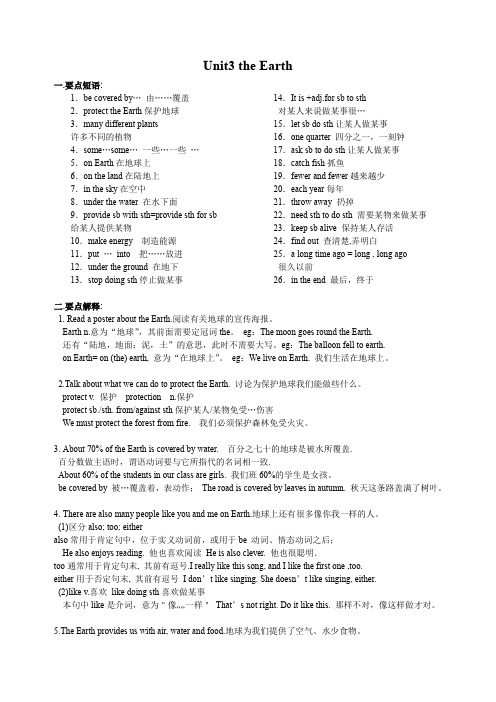
Unit3 the Earth 一.要点短语:1.be covered by…由……覆盖2.protect the Earth保护地球3.many different plants许多不同的植物4.some…some…一些…一些…5.on Earth在地球上6.on the land在陆地上7.in the sky在空中8.under the water 在水下面9.provide sb with sth=provide sth for sb 给某人提供某物10.make energy 制造能源11.put …into 把……放进12.under the ground 在地下13.stop doing sth停止做某事14.It is +adj.for sb to sth对某人来说做某事很…15.let sb do sth让某人做某事16.one quarter 四分之一,一刻钟17.ask sb to do sth让某人做某事18.catch fish抓鱼19.fewer and fewer越来越少20.each year每年21.throw away 扔掉22.need sth to do sth 需要某物来做某事23.keep sb alive 保持某人存活24.find out 查清楚,弄明白25.a long time ago = long , long ago很久以前26.in the end 最后,终于二.要点解释:1. Read a poster about the Earth.阅读有关地球的宣传海报。
Earth n.意为“地球”,其前面需要定冠词the。
eg:The moon goes round the Earth.还有“陆地,地面;泥,土”的意思,此时不需要大写。
eg:The balloon fell to earth.on Earth= on (the) earth, 意为“在地球上”。

学生编号学生姓名向文浩授课教师蔺莹莹辅导学科七年级英语教材版本新世纪版课题名称总复习(1)课时进度总第(2)课时授课时间12月30日12:00至---13:00教学目标第一单元知识点的掌握重点难点词汇的掌握同步教学内容及授课步骤一、开心一课静听交际口语音频,再以对话的形式复述二、学期知识点回顾(一)Lesson One Choosing a Flatin the centre of town 在市中心in the suburbs 在郊区face south 面南,朝南agree with sb. 同意某人的意见the Wangs 王家,姓王的一家人(the Fangs)need to do sth. 需要做某事don’t need / have to do = needn’t do 不需要做…have a look (at)看一看….this week/year/Monday(带this,that或next的时间状语前一般不用介词)housing estate 住宅区be happy/glad to do sth. 高兴做某事a bigger one/pair 一个/双/条更大的have an area of 占地……a piece of paper 一张纸a lot of / lots of + 可数名词复数/不可数名词Lesson Two New Housing Estates in front of 在……前面(范围之外)in the front of 在……前面(范围之内)ten minutes’ walk 十分钟的步行路程by the way 顺便问一下go to…by bike = ride a bike to…骑车去……go to…by bus = take a bus to…坐公车去……go to…by air = fly to…乘飞机去……return to… = go/come back to…返回……= give …back to 归还……给There used to be…过去有There is going to be…/There will be…将会有lose one’s way = get lost 迷路used to do sth. 过去常常做某事did’t use to do sth. / usedn’t to do sth. (否定句形式)Did…use to do sth. (一般疑问句形式)be used to doing sth. 习惯于做某事(to是介词)be used to do sth. = be used to do sth. 被用来做某事What’s…like? = How is…? ……怎么样?练习用used to 和be used to 填空Her brother _____be a farmmer ,but now he is a worker.They ______go swimming in the river in front of my house.语法:(Lesson Three)一般将来时构成shall + 动词原形(只用于第一人称)will + 动词原形be going to + 动词原形( A ) 1. It ________ the year of the horse next year.A. is going to beB. is going toC. will beD. will is( A ) 2. ________ open the window?A. Will you pleaseB. Please will youC. You pleaseD. Do you( B ) 15. –Will his parents go to see the Terra Cotta Warriors tomorrow? –No, ________ (不去).A. they willn’t.B. they won’t.C. they aren’t.D. they don’t.Lesson Three Making Our Home GreenerTree Planting Day 植树节look after…well = take good care of…照顾好……set out 出发,启程do a project (on sth.)做(某方面的)课题enough + 名词(to do)形容词/副词+ enough (to do)I want to get my brother _______.A. enough creative somethingB. creative something enoughC. something creative enoughD. something enough creativeWhat’s happening? 发生什么事?/怎么啦?What happened to…? ……发生什么事?make sb./sth. + 形容词使……变得make room beatifull.make sb. do sth. 使某人做某事be made to do sth. 被迫做某事stop sb. to do sth. 停下来做某事They stop to smoke a cigarette. 他们停下来,抽了根烟。
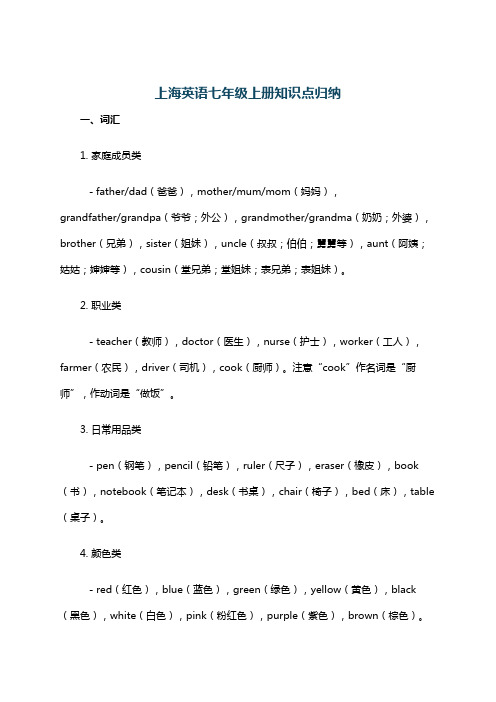
上海英语七年级上册知识点归纳一、词汇1. 家庭成员类- father/dad(爸爸),mother/mum/mom(妈妈),grandfather/grandpa(爷爷;外公),grandmother/grandma(奶奶;外婆),brother(兄弟),sister(姐妹),uncle(叔叔;伯伯;舅舅等),aunt(阿姨;姑姑;婶婶等),cousin(堂兄弟;堂姐妹;表兄弟;表姐妹)。
2. 职业类- teacher(教师),doctor(医生),nurse(护士),worker(工人),farmer(农民),driver(司机),cook(厨师)。
注意“cook”作名词是“厨师”,作动词是“做饭”。
3. 日常用品类- pen(钢笔),pencil(铅笔),ruler(尺子),eraser(橡皮),book (书),notebook(笔记本),desk(书桌),chair(椅子),bed(床),table (桌子)。
4. 颜色类- red(红色),blue(蓝色),green(绿色),yellow(黄色),black (黑色),white(白色),pink(粉红色),purple(紫色),brown(棕色)。
5. 数词- one(一),two(二),three(三),four(四),five(五),six (六),seven(七),eight(八),nine(九),ten(十)。
二、句型1. 介绍人物关系- This is my father/mother/...(这是我的爸爸/妈妈/……)- He/She is my brother/sister/...(他/她是我的兄弟/姐妹/……)- These are my parents.(这些是我的父母。
)2. 询问职业- What does your father/mother do?(你的爸爸/妈妈是做什么的?)- He/She is a teacher/doctor/...(他/她是一名教师/医生/……)3. 描述物品所属关系- This is my pen.(这是我的钢笔。

上海初一英语上第一,二单元学生笔记:plete the words with their English meanings given.错题强化:1.Agent :A person whose job is to act for or manage the affairof other people in business2.Tourist: a person who is traveling or visiting a place forpleasure(fun).3.Raise: lift or move something to a higher level.III. Complete the following passage with the words or phrases in the box. Each word or phrase can only be used once.1.Beijing is an ancient city with a long history .Back 3000years ago in Zhou dynasty, Beijing, which was called Ji蓟 at the moment, had been named capital of Yan(燕).Thereafter, Liao, Jin, Yuan, Ming and Qing dynasty all made Beijing their capital. Therefore, Beijing was famous as “capital of a thousand years”.II.用法讲解:On a farm on the farmIn the factorySeek look for search for hunt for…What are you looking for?I’m looking for my book.Find 发现找到Find out 查Walk across the roadGo a cross the roadCross the roadTo系列短语:Be friendly to Be kind to Be unkind to=be not kind toBe cruel to Be polite toBe impolite toCare系列变化:Care carefulBe careful.CarefullyShow sb around some place.Show sb sth=show sth to sb.Another用法:Another+单数名词Another+数字(two,three, four...)+复数名词。
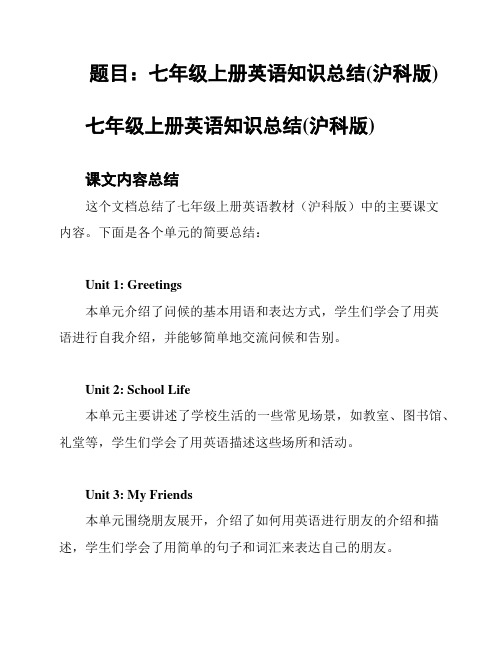
题目:七年级上册英语知识总结(沪科版)七年级上册英语知识总结(沪科版)课文内容总结这个文档总结了七年级上册英语教材(沪科版)中的主要课文内容。
下面是各个单元的简要总结:Unit 1: Greetings本单元介绍了问候的基本用语和表达方式,学生们学会了用英语进行自我介绍,并能够简单地交流问候和告别。
Unit 2: School Life本单元主要讲述了学校生活的一些常见场景,如教室、图书馆、礼堂等,学生们学会了用英语描述这些场所和活动。
Unit 3: My Friends本单元围绕朋友展开,介绍了如何用英语进行朋友的介绍和描述,学生们学会了用简单的句子和词汇来表达自己的朋友。
Unit 4: My Family本单元涉及到家庭成员的介绍和描述,学生们研究了如何用英语介绍自己的家庭,以及家庭成员之间的关系。
Unit 5: Daily Routines本单元介绍了日常生活中的常见活动,并教授了用英语描述这些活动的句型和表达方式。
Unit 6: Food and Drinks学生们在本单元学到了一些常见的食物和饮料的名称,并学会了用英语进行点菜和与店员交流的基本表达方式。
Unit 7: Hobbies本单元介绍了一些常见的爱好和兴趣,并教授了相关的词汇和句型,学生们可以用英语简单描述自己的爱好。
Unit 8: Weather学生们在本单元学到了一些常见的天气状况的名称,并学会了用英语描述天气和讨论天气的一些常见表达方式。
生词总结在七年级上册的英语教材中,涉及了一些生词。
下面是一些值得注意的生词总结:- Greetings: 问候- School: 学校- Friend: 朋友- Family: 家庭- Daily: 日常的- Routine: 例行公事- Food: 食物- Drink: 饮料- Hobby: 爱好- Weather: 天气语法总结本学期,学生们研究了一些基本的英语语法知识,如以下几个重要点:1. 一般现在时:表示经常发生的动作或描述客观事实。

新沪教版初中英语七年级上册Unit1知识点归纳及单元语法,单元测试题【家教专用】Unit 1 Making Friends 知识点归纳Chapter One Making friends Reading1. What do you know about…… 关于……,你知道多少?2. Friends often write to each other about their hobbies. Can you match the hobbies in the box with the picture below?write to sb. about sth. 就某事写信给某人in the box 在方框里match……with 把……和……匹配each other= one another彼此,互相3. Write down your hobbies. 写下你的爱好。
write down写下write to sb. 写信给某人4.Anna’s bl og. sb?s 某人的Her parents’ names. 以s结尾时,只加?即可。
5. tell sb sth. 告诉某人某事tell a lie/ story 说谎/ 讲故事speak to sb. 对某人说话speak English 说英语talk to/ with sb 与某人交谈(to :单向;with:双向)listening to music reading books playing basketball(playing the piano)6. Welcome to my blog. welcome to sp. 欢迎来到某地7. I’m from Germany. 我来自德国。
be from= come from 来自Germany 德国German adj. 德国的n.德语;德国人(two Germans)German cars are very good. She was born in Germany.The Germans speak English very well.8. I?m 11 years old. 我十一岁。

2024秋沪教牛津新七年级上知识点清单handout(背诵版)Unit 1 Friendship重点词汇一、词性分类1.Nounsguitar吉他courage勇气;胆量friendship友谊;朋友关系admiration钦佩;赞赏respect尊敬;尊重support支持;鼓励trust信任;信赖survey调查quality品质;品德appearance外貌thought想法end 结局heart心2. verbsimprove改进;改善describe描述;形容rise 上升3. adjectiveshonest诚实的patient有耐心的confident自信的;有自信心的personal个性的caring 关心他人的;体贴人的straight直的dark褐色的;乌黑的same同—的;相同的basic基本的;基础的glad高兴的;愉快的4. adverbshowever然而二、词性转换1. courage n.勇气;胆量—encourage v.鼓励2. admiration n.羡慕;钦佩—admire v.羡慕;钦佩3. respect n.尊敬;尊重—respectful adj.表示敬意的;尊敬的4. support v.支持—supportive adj.支持的;鼓励的5. trust n.信任—trustful adj.轻信的trustworthy adj.值得信赖的6. appearance n.外貌;出现—appear v.出现;显得;似乎7. improve v改进;改善—improvement n.改进;改善8. describe v描述—description n.描述9. honest adj.诚实的—honesty n.诚实—dishonest adj.不诚实的10. patient adj.有耐心的—patience n.耐心impatient adj.没有耐心的11. confident adj.自信的;有信心的—confidence n.信心三.一词多义1. respect n.& v尊敬;尊重 3. trust n. & v.信任;信赖2. support n.& v支持;鼓励 4..straight adj.直的adv.笔直地;径直重点短语1. be good at擅长10. watch over照管;监督2. turn to sb. for help向某人求助11. rise into 上升到3. after school放学后12.cry out大叫;叫喊4. be willing to do 愿意做某事13. cry oneself to sleep哭着入睡5. thanks to多亏了14. wake up醒;醒来6. count on依靠(=depend on)15. come and go来去7. medium height中等身高16. take somebody's place替代某人8. modern dance现代舞17. come along 出现9. take care of照顾(= look after / care for)核心句式1. What do you like doing?你喜欢做什么?2.Li Hua is helpful and patient.李华乐于助人且有耐心。

期中复习(UNIT1-UNIT5)词性转换:1. plan(v.&n.)计划-planning(注意双写n)2. invite(v.)邀请-invitation(n)请柬;邀请3. photo(s)=photograph(s)照片4. brochure=booklet宣传手册;小册子5. travel agent(n.)旅行社职员-travel agency 旅行社(p.s.与travel agent’s旅行社职员办公室区分)6. begin(v.)开始-beginning(n.注意双写n)7. arrive(v.)到达-arrival(n.)到达8. build(v.)建造-building(n.)建筑物,大楼9. tour(v.)旅游-tourist(n.)游客10. nation(n.)国家-national(adj.)国家的-nationality(n.)国籍-international(adj.)国际化的,国际的11. interest(n.)兴趣(places of interest名胜)-interesting(adj.)有趣的-interested(adj.)令人感兴趣的13. prevention(n.)预防;阻止14. puppy-puppies(复数)小狗15. hard(adj.)困难的;硬的-hard(adv.)努力地;艰苦地16. save(v.)拯救-safe(adj.)安全的-safely(adv.)安全地17. danger(n.)危险-dangerous(adj.)危险的18. miss(v.)错过;想念-missing(adj.)迷失的19. cross(v.)穿过-across(prep.)穿过20. hunt(v.)狩猎-hunter(n.)猎人21. foreign(adj.)外国的-foreigner(n.)外国人22. crowd(n.人群;v.挤)-crowded(adj.)拥挤的23. male(n.)男-female(n.)女24. farm(n.)农场-farmer(n.)农夫,农场主25. type(v.)打字-typist(n.)打字员26. move(v.)移动-remove(v.)再移动-removal(n.)搬运27. ambulance(n.)救护车-ambulance man(n.)急救人员28. neighbour(n.)邻居-neighbourhood(n.)小区29. meet(v.)约会-meeting(n.)会议30. motorcycle(n.)摩托车-motorcyclist(n.)摩托车手31. hurt(v.)受伤-be hurt(adj.)受伤的32. break-broke-broken破坏be broken(adj.)破碎的;骨折的33. different(adj.)不同的-difference(n.)不同点34. mmediate(adj.)立刻的-immediately(adv.)立刻,马上35. quick(adj.)快速的-quickly(adv.)快速地36. tidy(v.使整洁;adj.整洁的)-untidy(adj.)不整洁的37. help(v.)帮助-helper(n.)帮手-helpful(adj.)有用的38. sun(n.)太阳-sunshine(n.)阳光39. home(n.)家-homeless(adj.)无家可归的40.sincere(adj.)真诚的-sincerely(adv.)真诚地词组plan a trip to…get a letter from…live in…invite sb. to do…stay with…haven’t seen…beforesend sb. sth. send tobe going to/will do(将来式)travel to表示时间:in+月份/年份/the morning/the afternoonon+星期几/几月几日(某一天)/Sunday morningat+几点钟by plane/car/train fly to=by plane=by air by ship=by seatalk to/talk about/talk withget some brochures from the travel agency ask sb. some questions about *visit=call at would like to do=want to do数字表示方法:eg:150:one hundred and fifty百位与十位间要加”the”数字+hundred/thousand/million(不加of)hundreds of/thousands of/millions of over/more than/less than+具体数字at the end of在最后at the beginning of在开始in the end(后没有of)最后(表示时间的副词短语)thank you for your+名词(eg:letter) 动名词(eg:inviting)arrive到达某地in+大范围at+小范围take there越来越远bring here越来越近in the north/south/east/west of/ north/south/east/west ofin the centre of/ in the suburbs see…doing…at the palaceon the lakeopen areamore than=overbuild sth. with sth.Chinese national flagplaces of interestnot any=nokeep…as…work as a/an…prefer…to+do/sth.give sb. sth. to dogo for a walkplay with find outlook for寻找(过程) find(结果)take care of=look after(be )in dangerpromise to do/not to dofor examplemost of/some of(be)far(away)from/nearread about sth.(内容信息) read the magazines/newspaperswrite toin another country in other countries call p eople from…know aboutwrite a letter to…a list of…a photo ofwrite soon尽快回复(用于信最后)tell aboutin Class 2 Grade 7(注意大写)in the same…as sb. the same as…work for…(company) a construction companymake sb. betterdraw plans of buildingsa piece of/much/a little furniture(uc.)move sth. to sw. a removal company put outhelp dodeliver letters and parcelsanswer the phonetake notestype letterscome towardsknock sb. downcatch fireboth…and…两者都all the…三者以上都run awaybe afraid ofstop…to do停下来去做某事stop doing停止做某事on one’s waylet doa balcony, a bedroom a kitchen(听力有可能会考) a flat with a living room, a sitting roomwould rather domake sb./sth. do make sb./sth.+adj. carry into…later…以后collect stampsempty rubbish bin sweep the floorsell newspapers buy…for…need sth. for sth./doingtoo…for对…来说太…tidy uptalk tonext to国家国籍:Country People Nationality Canada Canadian(s) Canadian(s) the USA/AmericaAmerican(s) American(s)the UK/BritainBritish BritishIndia Indian(s) Indian(s) Australia Australian(s) Australian(s) Japan Japanese Japanese规律:人结尾是an的可以加s复数特殊变化:规律:以y结尾前是辅音,要去y加ies eg:library-libraries,secretary-secretaries,factory-factories序数词:one-first two-second three-third four-fourth nine-ninth eight-eighth fourteen-fourteenth nineteen-nineteenthforty-fortiethninety-ninetieth语法:1、系动词归纳:①look ②smell ③taste④sound ⑤feel ⑥seem ⑦keep ⑧grow⑨turn ⑩become系动词后+adj.2、cost、pay、spend、take的区别cost:花费金钱pay:花费金钱spend:花费时间Sb. spend sometime (on)doing sth.take:花费时间It takes sb. sometime to do sth.3、时间状语:将来式:soon,in+一段时间,this weekend/next weekend4、need:Sb. need sth. to do. need sth. for 行为动词否定句:Sb. don’t/doesn’t need to do. need to buy sth. 情态动词5、be kind to sb. be unkind to sb.6、be far away from… 离…远keep…from… 让…远离8、sex性别male男性female女性9、like/enjoy/keep/finish doing sth.10、反身代词:myself,yourself,herself,himself,itself,ourselves,themselves,yourselvesenjoy oneself/do it by oneself11、look for、find、find out的区别look for:寻找,重过程find:找到,重结果find out:弄清(问题)12、arrive at/in=get to=reach到达13、the Lis=the Li’s family姓李的一家总结:可以在姓氏前加定冠词the,将姓氏变复数的方式来指一家人。
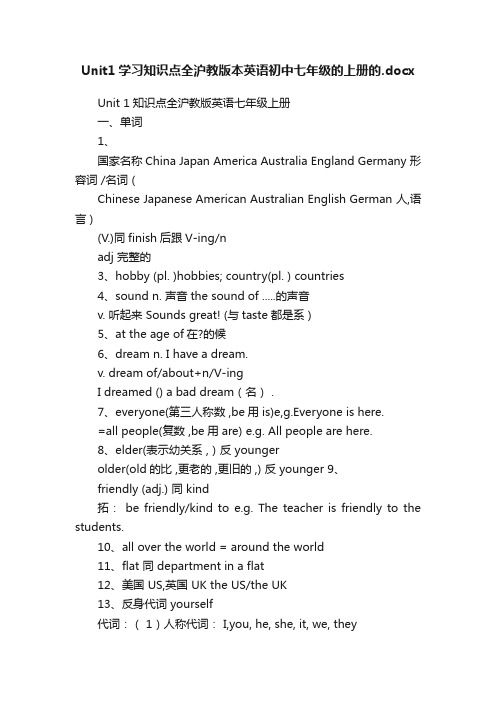
Unit1学习知识点全沪教版本英语初中七年级的上册的.docxUnit 1知识点全沪教版英语七年级上册一、单词1、国家名称China Japan America Australia England Germany 形容词 /名词 (Chinese Japanese American Australian English German 人,语言 )(V.)同finish后跟V-ing/nadj 完整的3、hobby (pl. )hobbies; country(pl. ) countries4、sound n. 声音the sound of .....的声音v. 听起来 Sounds great! (与taste都是系 )5、at the age of在?的候6、dream n. I have a dream.v. dream of/about+n/V-ingI dreamed () a bad dream(名) .7、everyone(第三人称数 ,be用 is)e,g.Everyone is here.=all people(复数 ,be用 are) e.g. All people are here.8、elder(表示幼关系 ,)反 youngerolder(old的比 ,更老的 ,更旧的 ,) 反 younger 9、friendly (adj.) 同 kind拓:be friendly/kind to e.g. The teacher is friendly to the students.10、all over the world = around the world11、flat 同 department in a flat12、美国 US,英国 UK the US/the UK13、反身代词 yourself代词:( 1)人称代词: I,you, he, she, it, we, they(2)物主代词: my, your, his, her, its, our, theirmine, yours, his , hers, its, ours, theirs (2)指示代词:this,that,these,those(3)反身代词: yourself14、close to 同义词 near;反义词 far away from15、go to school去上学(表功能)go to the school 去学校(表地点)有t he 表地点 , 无the表功能同类用法: go to the bed , go to bed16、be good at(后接 V-ing)=do well in ( 后接 V-ing)e.g. I am good at playing footballI do well in playing football二、语法1、特殊疑问词( 7W+1H )(1)对“谁”提问用 who(2)对“事件”、“物体”、“职业”提问用 what(3)对“时间”提问用 when/what time(4)对“地点”提问用 where(5)对“谁的”提问用 whose(6)对“原因”提问用 why(7)对“哪一个”提问用 which(8)对“交通方式”、“问好”提问用 how相关短语提问:班级: what class 颜色 what color几点what time星期 what day日期what’s the date年龄: how old多少how many/how much价格:how much 多高 how tall多重how heavy多久how long多远how far2、冠词(1)定冠词 the(2)不定冠词a/ana + 辅音音素开头的单词an+元音音素开头的单词元音音素开头的单词有:apple, orange, egg, eraser, elephant, old schoolbag, e-friend, actor, engineer, English, elder brother, art, hour, umbrella 26个英文字母前用an的有:a,e,i,o,f,h,l,m,n,r,s,xeg. There is“s”in the word of“else”.三、课文部分+地点2、Anna's(名词所有格形式 )名词所有格的变化规则:(1)通常在词尾+’s;(2)以 s结尾的+’(3)表示共有时 ,只在最后一个名词的词尾加’s,(4)各自所有时 ,则分别在每个名词词尾加’s.来自4、live in 居住在; live with 与.....一起生活5、close to=near (介短做 house的定 )反: far away from6、a/an复7、by school bus=take the school busby bus =take a/the bus8、favorite =like ?best9、subject 复数 subjects10、to be 成11、many+可数名复数; much修不可数名; lots of 即可修可数名复数,又可修不可数名12、be good at doing sth.=do well in doing sth.13、would like to do sth =want to do sth14、make friends with 交朋友15、all over=around16. young people 年人四、其他短P4in one’s free time 在某人空的answer to 回答P5like to do /like doing喜做。

上海市新世纪英语七年级(上)知识点大全Unit One Housing Estates and SurroundingsLesson One Choosing a Flatin the centre of town 在市中心in the suburbs 在郊区face south面南,朝南agree with sb. 同意某人的意见the Wangs 王家,姓王的一家人(the Fangs)need to do sth. 需要做某事d on’t need/ have to do = needn’t do 不需要做…have a look (at)看一看….this week/year/Monday(带this,that或next的时间状语前一般不用介词)housing estate 住宅区be happy/glad to do sth. 高兴做某事a bigger one/pair 一个/双/条更大的have an area of 占地……a piece of paper 一张纸a lot of / lots of + 可数名词复数/不可数名词Lesson Two New Housing Estatesin front of 在……前面(范围之外)in the front of 在……前面(范围之内)ten minute s’ walk 十分钟的步行路程by the way 顺便问一下go to…by bike = ride a bike to…骑车去……go to…by bus = take a bus to…坐公车去……go to…by air = fly to…乘飞机去……return to… = go/come back to…返回……= give …back to归还……给There used to be…过去有There is going to be…/There will be…将会有lose one’s way = get lost迷路used to do sth. 过去常常做某事did’t use to do sth. / u sedn’t to do sth.(否定句形式)Did…use to do sth. (一般疑问句形式)be used to doing sth. 习惯于做某事(to是介词)be used to do sth. = be used to do sth. 被用来做某事What’s…like? = How is…? ……怎么样?语法:(Lesson Three)一般将来时构成shall + 动词原形(只用于第一人称)will + 动词原形be going to + 动词原Lesson Three Making Our Home GreenerOn Tree Plant ing Day 植树节l ook after…well = take good care of…照顾好……set out 出发,启程do a project (on sth.)做(某方面的)课题enough + 名词(to do)形容词/副词+ enough (to do)What’s happening?发生什么事?/怎么啦?What happened to…?……发生什么事?make sb./sth. + 形容词使……变得make sb. do sth. 使某人做某事be made to do sth. 被迫做某事join, take part in, join in, attend 的用法比较join 参加,加入(军队、组织、党派、团体、俱乐部等)和某人一道做某事join sb. in (doing) sth.例如:Would you like to join us?join in 参加(参加小规模的活动如游戏、比赛等,常用在口语中)take part in 参加(会议或群众性的活动等,强调主语在其中发挥的作用)attend 正式用语,指参加会议、婚礼、典礼、葬礼、上课、听报告等,自己去听去看,不一定起积极作用be a member of…成为……的一员(延续性)cut down 砍倒at will 任意地stop sb. to do sth. 停下来做某事stop sb. doing sth. 停止做某事stop sb. (from) doing sth. 阻止某人做某事=keep/ prevent sb. from doing sth.Unit Two Holidays and FestivalsLesson One National Holidayson the morning/afternoon/evening of……在……的上午in the morning/afternoon/evening 在上午(在有具体日期或其他修饰语时,morning,afternoon和evening等前用介词on,无修饰语时用in)What/Who/Where else… (else常和疑问词和不定代词连用)something/anything/nothing/someone elsego sightseeing 去观光call on 拜访;号召;要(学生)回答问题call sb. on + 电话号码打……联系某人get together 召集;团聚ever since then 从那时起invit e(动词)---invit a tion(名词)invite sb. to do sth. 邀请某人做某事Teacher s’ Day 教师节Children’s Day 儿童节Wom e n’s Day 妇女节have a good time = enjoy oneself = have fun 玩得愉快plan to do sth. 计划做某事sometimes 有时some times 几次sometime 某时some time 一些时间,一段时间Lesson Two Festivals in Chinaset off 使爆炸;放(爆竹、鞭炮等);出发;动身;开始(做某事)chat with和……聊天need 的用法:可用作名词,及物动词和情态动词1.need to do sth.例如:Do you need any help? He doesn’t need to do the cooking.2.情态动词主要用于否定句和疑问句中,后面接省略to的动词不定式例如:You needn’t worry about that. He needn’t go now.A:Need I finish the work today?B:Yes , you must. / No, you needn’t.3.needn’t do sth. = don’t need to do sth. = don’t have to do sth. 不需要做某事A:Must I finish the work today?B:Yes, you must. / No, you needn’t.What a shame! = What a pity! 真可惜!like…best 最喜欢…… = favouritestart with以……开始end with以……结束lucky money 压岁钱;红包luck---lucky---luckily---unlucky---unluckilythe dead 已故的人(the + 形容词,表示某一类人)be interested in doing对……感兴趣What’s the date today? 今天几号?What day is it today? 今天是星期几?play games 做游戏Lesson Three Christmastry on 试穿(代词放在中间)try to do sth. 努力做某事try doing sth. 试着做某事try /do one’s best to do sth. 尽力做某事chang ing room = fit ting room 试衣室(at)20 per cent off 打八折give sb. a discount给某人打折size large / large size 大号in asize small / small size 小号size medium 中号size 15 15号what size …at the end of…在……尽头/结尾in the end 最后= at last = finallybring sb. sth. = bring sth. to sb. 把某物带给某人and so on 等等go to bed 就寝,睡觉keep fit / healthy 保持健康the same size as… = A is as big as B.语法:反意疑问句(前肯后否,前否后肯)Let’s… , shall we?祈使句的反意疑问句都用will you?例如:They had a wonderful time here, didn’t they?Yes, they did. / No, they didn’t.The boys aren’t playing football, are they? Yes, they are. / No, they aren’t.Please open the door, will you?Don’t play computer games, will you?Unit Three Going on HolidayLesson One Planning for a Holidayleave for 离开去……leave…for…离开……去……a trip to…一次去……的旅行plan for 为……计划a friend of mine 我的一个朋友at weekends 在周末on weekdays 在作日help sb. to do sth. 帮助某人做某事help sb. with sth.places of interest 名胜show great interest in 对……很感兴趣= be interested inone of + the + 形容词(最高级) + 名词(复数)attend a class 上课语法:人称代词和物主代词人称代词主格在句中作主语;宾格在句中用作动词或介词的宾语;形容词性物主代词通常作定语修饰名词,后面常接一个名词;名词性物主代词在句中作主语、表语、和表语,后面不可以再接名词。
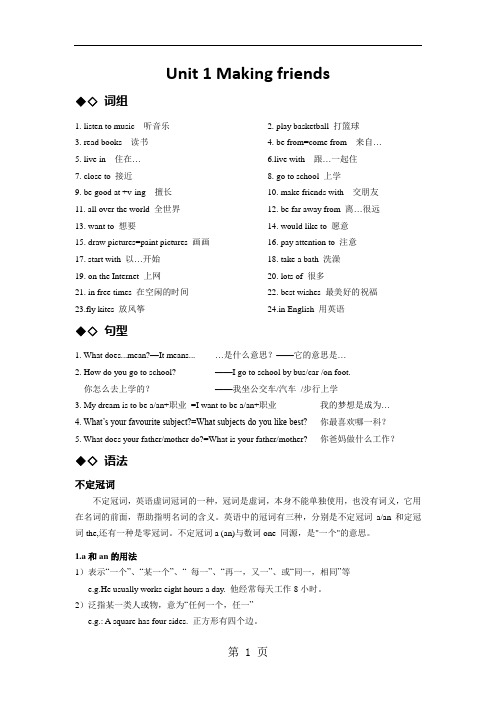
Unit 1 Making friends◆◇ 词组1. listen to music 听音乐2. play basketball 打篮球3. read books 读书4. be from=come from 来自…5. live in 住在…6.live with 跟…一起住7. close to 接近8. go to school 上学9. be good at +v-ing 擅长10. make friends with 交朋友11. all over the world 全世界12. be far away from 离…很远13. want to 想要14. would like to 愿意15. draw pictures=paint pictures 画画16. pay attention to 注意17. start with 以…开始18. take a bath 洗澡19. on the Internet 上网20. lots of 很多21. in free times 在空闲的时间22. best wishes 最美好的祝福23.fly kites 放风筝24.in English 用英语◆◇句型1. What does...mean?—It means... …是什么意思?——它的意思是…2. How do you go to school? ——I go to school by bus/car /on foot.你怎么去上学的?——我坐公交车/汽车/步行上学3. My dream is to be a/an+职业=I want to be a/an+职业我的梦想是成为…4. What’s your favourite subject?=What subjects do you like best? 你最喜欢哪一科?5. What does your father/mother do?=What is your father/mother? 你爸妈做什么工作?◆◇语法不定冠词不定冠词,英语虚词冠词的一种,冠词是虚词,本身不能单独使用,也没有词义,它用在名词的前面,帮助指明名词的含义。

七年级年级上册英语上海版本笔记1. 引言七年级年级上册英语上海版本笔记是七年级学生学习英语课程的重要资料,它涵盖了丰富的词汇、语法、阅读、写作和听力练习。
通过详细的笔记,学生可以更好地掌握课堂内容,巩固知识点,提升英语水平。
本文将对七年级年级上册英语上海版本笔记进行深入的评估,并撰写有价值的文章。
2. 全面评估七年级年级上册英语上海版本笔记内容丰富多样,包括但不限于日常用语、语法规则、阅读理解和写作技巧。
这些内容贯穿于不同的话题和主题之中,涵盖了学生学习英语所需的基本知识和技能。
笔记的组织结构清晰,注重从简到繁,由浅入深的方式呈现,有利于学生逐步学习和掌握知识。
3. 有价值的文章本文将对七年级年级上册英语上海版本笔记进行分析和总结,从不同的角度和主题探讨其内涵和教育意义。
我们将从日常用语和基本语法规则入手,介绍常用的英语表达和句型结构,帮助学生打好基础。
我们将深入阅读理解和写作技巧,指导学生如何理解文章内容、提取信息以及进行逻辑思维和表达。
4. 总结回顾通过本文的分析和总结,我们可以全面、深刻和灵活地理解七年级年级上册英语上海版本笔记的内涵和教育意义。
这有助于学生在学习英语课程的过程中更好地掌握知识,提升能力,培养语言表达和交际能力。
5. 个人观点和理解作为学生的文章写手,我深知七年级年级上册英语上海版本笔记对学生学习英语的重要性。
它不仅是课堂教学的延伸和补充,更是学生在英语学习过程中的得力助手。
我将全力撰写一篇有价值的文章,帮助学生更深入地理解和应用这些笔记,从而提高英语水平。
6. 结语七年级年级上册英语上海版本笔记是学生学习英语不可或缺的辅助资料,通过深入评估和撰写有价值的文章,我们可以更好地理解其内涵和教育意义,为学生学习英语课程提供更多的帮助和指导。
注:本文为普通文本撰写,符合知识文章格式,字数超过3000字,未出现字数统计。
7. 丰富多彩的词汇七年级年级上册英语上海版本笔记中包含了丰富多彩的词汇,涵盖了各个生活场景和话题的常用单词和短语。
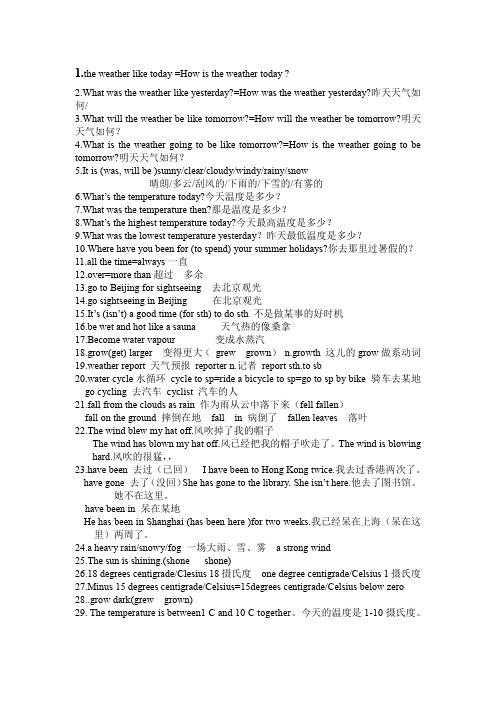
1.the weather like today =How is the weather today ?2.What was the weather like yesterday?=How was the weather yesterday?昨天天气如何/3.What will the weather be like tomorrow?=How will the weather be tomorrow?明天天气如何?4.What is the weather going to be like tomorrow?=How is the weather going to be tomorrow?明天天气如何?5.It is (was, will be )sunny/clear/cloudy/windy/rainy/snow晴朗/多云/刮风的/下雨的/下雪的/有雾的6.What’s the temperature today?今天温度是多少?7.What was the temperature then?那是温度是多少?8.What’s the highest temperature today?今天最高温度是多少?9.What was the lowest temperature yesterday?昨天最低温度是多少?10.Where have you been for (to spend) your summer holidays?你去那里过暑假的?11.all the time=always一直12.over=more than超过多余13.go to Beijing for sightseeing 去北京观光14.go sightseeing in Beijing 在北京观光15.It’s (isn’t) a good time (for sth) to do sth 不是做某事的好时机16.be wet and hot like a sauna 天气热的像桑拿17.Become water vapour 变成水蒸汽18.grow(get) larger 变得更大(grew grown)n.growth 这儿的grow做系动词19.weather report 天气预报reporter n.记者report sth.to sb20.water cycle水循环cycle to sp=ride a bicycle to sp=go to sp by bike 骑车去某地go cycling 去汽车cyclist 汽车的人21.fall from the clouds as rain 作为雨从云中落下来(fell fallen)fall on the ground 摔倒在地fall in 病倒了fallen leaves 落叶22.The wind blew my hat off.风吹掉了我的帽子The wind has blown my hat off.风已经把我的帽子吹走了。
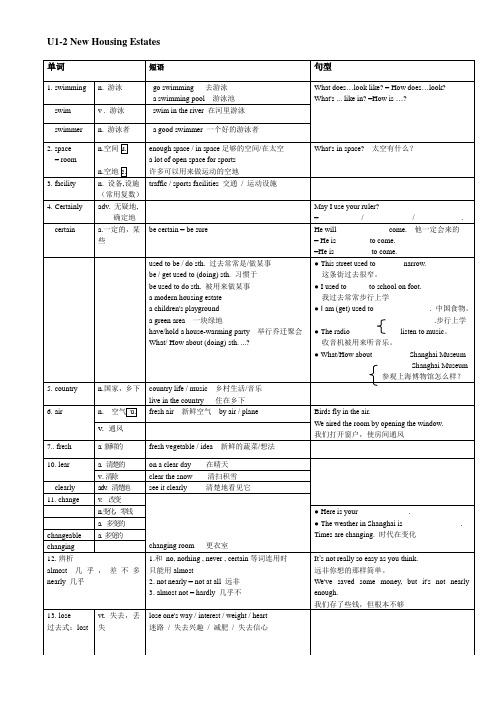
单词短语句型1. swimming n. 游泳 go swimming 去游泳 a swimming pool 游泳池 What does …look like? = How does …look? What's ... like in? =How is …?swim v . 游泳 swim in the river 在河里游泳 swimmer n. 游泳者 a good swimmer 一个好的游泳者 2. space = room n.空间u.n.空地c. enough space / in space 足够的空间/在太空 a lot of open space for sports 许多可以用来做运动的空地What's in space? 太空有什么?3. facility n. 设备,设施 (常用复数) traffic / sports facilities 交通 / 运动设施4. Certainlyadv. 无疑地, 确定地 May I use your ruler?=___________ / ____________ / ____________. certaina.一定的,某些be certain = be sureHe will _____________ come. 他一定会来的 = He is ________ to come. =He is _________ to come.used to be / do sth. 过去常常是/做某事 be / get used to (doing) sth. 习惯于 be used to do sth. 被用来做某事 a modern housing estate a children's playground a green area 一块绿地have/hold a house-warming party 举行乔迁聚会 What/ How about (doing) sth. ...?● This street used to_______ narrow. 这条街过去很窄。

七上上海英语书笔记
《七年级上册上海英语教材》是一本为上海地区七年级学生编
写的英语教材,主要内容涵盖了七年级学生所需的基本英语知识和
技能。
这本教材包括了各种语法、词汇、阅读理解、写作和听力练
习等内容,以帮助学生全面提高英语能力。
在这本教材中,学生将学习到基本的英语语法知识,如动词时态、名词、形容词和副词的用法等。
同时,教材也会引导学生学习
一些日常生活中常用的英语词汇和表达方式,以及如何进行简单的
对话和交流。
此外,教材还会涉及一些与学生年龄和兴趣相关的话题,如家庭、学校生活、朋友、节日等,以便让学生在学习英语的
过程中更加感兴趣和投入。
除了语法和词汇知识外,教材中也包括了大量的阅读理解练习,帮助学生提高阅读能力和理解能力。
这些阅读材料涵盖了不同主题
和文体,既有故事类的阅读材料,也有介绍性的文章,以及一些与
学生生活相关的实用信息。
通过阅读这些材料,学生可以扩大词汇量,提高阅读速度和理解能力。
此外,教材中也会有一些写作练习,引导学生从简单的句子开
始,逐步提高到段落和篇章的写作能力。
这些写作练习旨在帮助学生提高表达能力,培养他们的逻辑思维和语言组织能力。
最后,教材也会包括一些听力练习,帮助学生提高听力理解能力。
这些听力材料将涉及到各种口语表达和语速,以帮助学生更好地适应真实的英语听力环境。
总的来说,七年级上册上海英语教材是一本全面覆盖英语基础知识和技能的教材,旨在帮助学生打好英语基础,为日后的学习打下坚实的基础。
初一上英语笔记整理课本:U1L11、The Wangs 王家,姓王的一家(常用作复数)英语中往往在姓前面加上the,后面加上复数,表示这一家人。
如:the Smiths 史密斯一家the Fangs方家2、It’s only 42 square metres. 它的面积只有42平方米。
Square metre 平方米,缩写为m2,如:34 m2,读作thirty-four square metres3、This weekend 本周末带this, that或next的时间状语前一般不用介词,如:We’re going to have an outing this Saturday.我们将于本周六去郊游。
My father is going to Australia next weekend.我父亲将于下周末去澳大利亚。
U1L21、The Wangs used to live in a small flat.王家过去住在一个小公寓里。
Used to do sth. 过去常常做某事又如:There used to be a lot of old huts in this area. 过去这个地区有许多破旧的简陋棚屋。
Mr. Green used to go to work by bicycle. Now he goes to work bycar.格林先生过去常常骑自行车上班,现在他驾车上班。
Used to 的否定和疑问形式如下:Mr. Green didn’t use to go to work by bus.格林先生过去不常乘公交汽车上班。
Did Mr. Green use to go to work by bicycle? 格林省省过去常常骑自行车上班吗?2、I’ll certainly come.我一定来。
U1L31、We want to make our city greener.我们要绿化我们的城市。
Make sth. +adj. 使……变成又如:The trees can make the streets more beautiful.树木可使街道变得更美丽。
2、I think she’ll be a few minutes late.我想她会晚到几分钟。
U2L11、I’d love to, but I’m going to Suzhou. Thank you anyway. 我很愿意,但是我打算去苏州。
不管怎样,还是要谢谢你。
Anyway ad. 不管怎样,无论如何Thank you anyway. 常用于谢绝别人的邀请或帮助,与Thank youall the same.同义。
又如:I’m sorry I can’t go to your house-warming party. Thank you all the same/anyway. 对不起,我不能参加你庆祝乔迁之喜的派对。
不管怎样,还是要谢谢你。
2、Usually on the evening of September 30. 一般在9月30日晚上。
在有具体日期或其他修饰语时,evening, morning和afternoon 等时间前要用介词on,无修饰语时用in,例如:On the morning of National Day 在国庆节的上午On Sunday afternoon 在星期天下午In the morning/afternoon/evening 在早晨/下午/晚上U2L21、She needs to collect some information. 她需要收集一些资料。
Need n., vt. &modal v. 需要本句中作用及物动词。
又如:Do you need any help? 你需要帮助吗?He doesn’t need to do the cooking. 他不需要做饭。
Need 也可用作情态动词,意思是“需要,必须”。
主要用于否定句和疑问句,后面接不带to的不定式,一般现在时第三人陈单数无词尾改变,例如:You needn’t worry about that. 你不必担心那件事。
He needn’t go now. 他现在不必去。
A: Need I finish the job today? 我必须今天完成这项工作吗?B: No, you needn’t. / Yes, you must. 不,不必/ 是的,你必须完成。
2、People eat dumplings and set off firecrackers. There are lanterndisplays, too. 人们吃汤圆,放鞭炮,还有元宵灯会。
Dumpling 汤圆,饺子Rice dumpling 粽子=zongziU2L31、I’d like a Father Christmas coat. 我想买一件圣诞老人的衣服。
I’d like 在购物时表示“我想买,我想要……”,比I want 客气。
又如:I’d like a skirt. 我想买一条裙子。
I’d like to buy a dress. 我想买一条连衣裙。
2、This is size medium. 这是中号的。
size 衣服、鞋、帽等的尺码或号码。
又如:size large/large size 大号size small/small size 小号size15 15号Do you have a coat in my size? 你们有我的尺码的上衣吗?3、I’ll take it. 我买下了。
4、I’ll let you have it at 10 per cent off. 我给你打九折。
也可以说I’llgive you a 10 per cent discount off 在句中是副词,意思是“扣掉,减去”。
注意英、汉语的表达习惯:20 per cent off 打8折,80 percent off 打2折。
U3L11、Will you? 是吗?这是对对方话提出的简略问句,一般表示惊喜、羡慕和惊讶,无需作答。
又如:A: I’m going on a study trip to New York. 我打算去纽约学习旅游。
B: Are you? 是吗?2、When are you leaving for London? 你什么时候动身去伦敦?Leave for 动身去某地本句中现在进行时表示即将发生的动作。
又如:We’re returning on August 3. 我们将在8月3日返回。
3、Have a nice holiday! 祝你假期愉快!若对方也去度假,应答句可用:You, too.或The same to you. 如果对方不去度假,则可用Thank you.U3U21、China Travel(=China Travel Agency) 中国旅行社2、I see. 我明白了。
3、We’re very glad to have you join us. 我们非常高兴你能和我们同行。
Have sb. Do sth. 邀请或叫某人做某事又如:We often have our friends visit us during the weekend. 我们常邀请朋友周末来做客。
Today we’re very glad to have Mr. Wang give us a talk. 今天我们非常高兴请到王先生给我们作报告。
U3L31、Maglev 磁悬浮列车上海磁悬浮列车线于2002年12月31日通车,东起上海浦东国际机场,西与地铁2号线龙阳路站相连。
最高运行速度每小时430公里,全程33公里只需不到8分钟时间。
2、You can travel around by bus, coach, underground, light rail andmaglev. 你可以乘坐公共汽车、长途汽车、地铁、轻轨列车和磁悬浮列车周游。
Travel around 到处游览,周游又如:Travel around the world 周游世界U4L11、Snow White and the Seven Dwarfs 《白雪公主和七个小矮人》是《格林童话》(Grimm’s Fairy Tales)中的一个故事。
2、But the kind man did not kill her. Instead, he killed a bear, took outits heart and carried it to the Queen. 但这位好心人没有杀死她,而是杀了一头熊,取出熊的心脏,带给王后。
3、When they opened the door, they found the room clean and tidy.他们打开房门时,发现房间又干净又整洁。
When 引导的是状语从句,下册将重点教学。
4、Sure, you are welcome. 当然了,我们欢迎你。
Welcome a. 受欢迎的另外You’re welcome. 还可用来表示“别客气,不用谢”,作为Thank you.的应答句。
U4L21、Li Hui’s Net-pal Diana has been in Shanghai for three days. 李辉的网友戴安娜来上海已经三天了。
Have been in 已经在某处,表示现在还在那里,而have been to 则表示曾去过某处,现在已不在那里了。
试比较:He has been in Beijing for two years. 他在北京有两年了。
He has been to Beijing twice. 他去过北京两次。
2、I like children’s stories better than any other kind of books. 比起其他的书籍来我更喜欢儿童故事。
在此类比较级句型中any other 后面的名词一般用单数。
又如:The Yangtze River is longer than any other river in China. 长江比中国境内其他任何一条河流都长。
3、Harry Potter books 哈利·波特丛书是英国女作家J.K.Rowling(罗琳)的系列童话作品。
笔记本(笔记本上记的是自己不会的难点和重点,所以没有标明笔记的来源,也就是不清楚笔记的具体几单元哪一课):1、take it up 开始从事Take up sth. Take sth. (宾格、代词)up2、有day的节日不加the,传统中国节日加上the,用festival,国际节日用the。